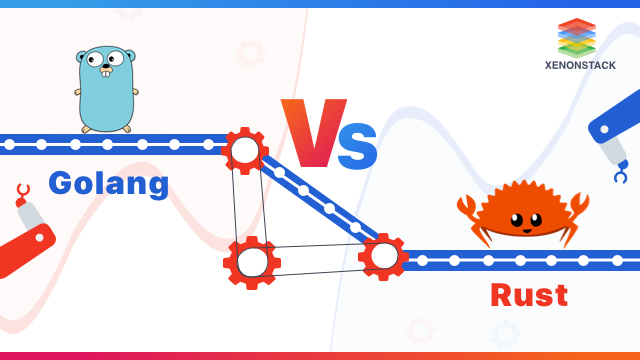
Introduction to Golang and Rust
There was a time when we used assembly language to write complex programs. Then came C, C++ like languages, and changed the development game. Now, if you were to make a list of the most important programming languages that are best suited for developing a microservices friendly framework, which is secure as well, you will only find people debating about two of the most used technologies, Golang and Rust. Why so? Are we wrangling on Golang vs Rust? Over time, these languages have emerged as the main options for developing enterprise applications. Go language or Golang was developed by Robert Griesemer, Rob Pike, and Ken Thompson at Google in 2007. On the other hand, Rust was developed by Graydon Hoare at Mozilla in 2010. Yes, both are compiled to machine code. But to find out the better one, let’s discuss these programming languages in brief.Rust
Rust was developed in 2010 as a systems programming language that has multiple paradigms. The Rust compiler is one of the most used open-source programming language compiler built to create robust and efficient software. It also provides better memory safety, really high-performance output, and really high modularity. Rust refines upon the ideas of other systems languages like c++ by providing guaranteed memory safety also ensures no crashes and no data races.Seventy-five percent of those respondents identified as users of Rust, an increase from last year’s 66.9 percent. Report: Rust productivity still poses a challenge, SD TimesRust is developed to preserve large-system integrity. It has been developed to have control of memory layout, concurrency, and performance equal to c++. Rust can also run on embedded services, and it can easily be integrated with other languages, with no garbage collector. As a compiler, it is very reliable and allows us to eliminate bugs during the program's compilation.
| Pros | Cons |
| Faster than languages like C/C++ | Lacks an efficient garbage collection |
| A multi-purpose language, bearing excellent communities | Can't develop codes as fast as other programming languages like ruby, python |
| Having an inbuilt dependency builds management called Cargo. | Developers might take longer to learn it due to its complexities |
Golang
Go language was developed in 2008. It was motivated by the insufficiency in other google languages like c++. They wanted to develop a new language that enhances and elevates the coding experience. Multiple organizations are using Golang for developing open-source projects. It is a static type of syntactical language, which is very similar to the C language. However, Golang has an advantage in terms of memory safety, structural typing, and garbage collection.One preliminary result from our recent survey is that 96% of users have now adopted Go modules (up from 90% a year ago). Source: The Go BlogGolang is an open-source programming language that is simple to understand and is very effective and a very reliable language to build efficient software. It also includes very rigorous dependency management and is very robust across different boundaries between different components and software architectures. The initial idea behind the development of Golang was to keep it really simple for developers.
| Pros | Cons |
| A statically typed programming language, providing great simplicity while coding | A general-purpose language |
| Very concise and easy to read |
Not a System language, i.e., can't be used to create programs that usually control hardware.
|
| Incredibly fast, even faster than python, Javascript, Java, C# | Lacks the support of generics |
| Provides a rich standard library |
Lacks a UI tool kit, despite having a vibrant library section
|
Golang vs Rust: The Benchmark
Go, and Rust are similar as both languages are very young programming languages but are widely used today. Go and Rust has some other similarities as well. Both of these languages are compiled languages, and both are open source, and both are designed for the development of microservices oriented parallel computing environments. Rust and Golang are both qualified languages, or we can say both are adequate for designing web applications. Either of these is quite capable of handling very high volume traffic. Both Rust and provide amazing performance.Golang vs Rust: The Popularity
Both of these languages have an auspicious future. Both languages cater to a larger or broader set of programmer audience. However, according to the survey and the latest trends, Golang is a lot faster than Rust. The other reason to choose Golang is that when working with a larger team of developers or an array of services to write, Golang is a much better choice.Golang is currently in 13th position, according to the TIOBE Index for November 2020.
Golang makes it uncomplicated to build a nicely factored application that takes full advantage of concurrency while being deployed as a microservice set. Rust mostly performs all of the above-mentioned things, but it is arguably a bit tougher. Rust has a fixation with inhibiting memory-related security susceptibility, which means that the coder has to go out of their way to perform that task, which would be a lot simpler in other languages, including Golang. Golang is an ideal choice for building applications where security is not the only main concern. Other factors, like building a flexible and extensible framework, are also important.
.webp?width=1921&height=622&name=usecase-banner%20(1).webp)


